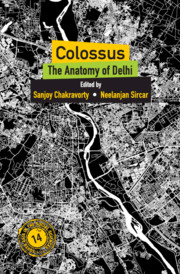3 - Housing and Settlements: Invisible Planning, Visible Exclusions
Published online by Cambridge University Press: 31 July 2021
Summary
Introduction
Delhi is India's richest city, and as the capital of the nation, it has long enjoyed a favorable treatment from the center. As the home to the country's national bureaucracies, it also benefits from a large base of secure, well-paid, government jobs. Over the last decade, the city has grown at an average real rate of 10 percent and has benefitted from a dramatic increase in large-scale infrastructure development. Yet, despite these advantages, Delhi is a deeply divided city marked by layers of social exclusion.
In the modern imaginary, the city represents the promise of freedom and opportunity. It marks a social space that is less constrained by traditional identities and one in which greater social interaction and density support economic dynamism. If development must, as Amartya Sen has so influentially argued, be based on strengthening basic capabilities, then the city can surely be a privileged site of capability enhancement. Indeed, the migrants who flood the city often come in search of better livelihoods, education, health, and basic services. But as any resident of Delhi knows, the quality of such services varies dramatically across neighborhoods, and the part of the city one lives in significantly impacts one's ability to take full advantage of what the city has to offer. This chapter summarizes findings from the Cities of Delhi (CoD) (citiesofdelhi.cprindia.org) project based on fieldwork from the end of 2012 to the middle of 2015. We document the extent to which India's capital is marked by different settlement types, defined by diverse degrees of formality, legality, and tenure, which taken together produce a highly differentiated pattern of access to basic services.
This chapter has three objectives. The first is to document as carefully as possible the quality and scope of access to basic services in the less privileged areas of the city. We focus on basic services such as electricity, water, sanitation, and solid-waste removal because these are clearly constitutive of core capabilities, relatively easy to measure (as compared to health or educational services), and well within the reach of a city such as Delhi under current levels of economic development, with a per capita gross state domestic product of more than USD 8,000 in purchasing power parity terms. Our second objective is to map the distribution of these services and, in particular, to understand how they are unevenly spread across different settlement types.
- Type
- Chapter
- Information
- ColossusThe Anatomy of Delhi, pp. 88 - 119Publisher: Cambridge University PressPrint publication year: 2021



